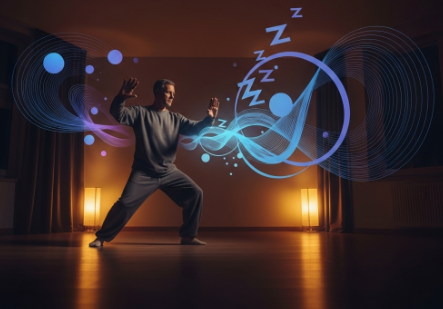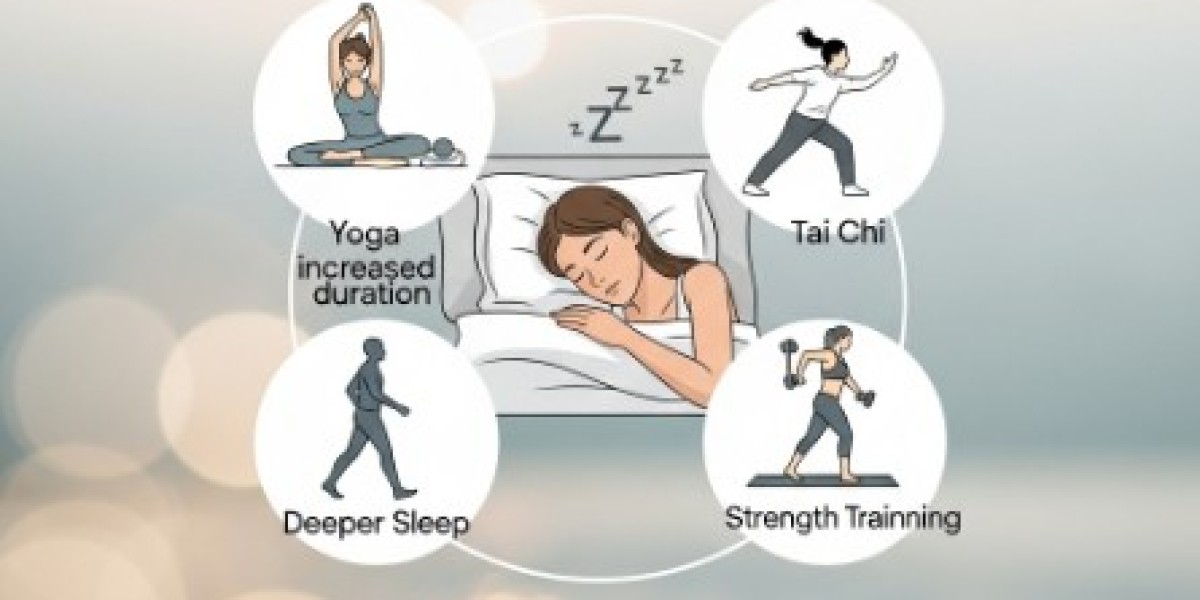Better Sleep: Four Simple, Science-Backed Exercises for Long-Term Solutions
By: Mark A. Garcia
Struggling with sleep can feel like an endless battle, impacting everything from your energy levels to your mood. While countless remedies exist, a groundbreaking new study offers a refreshing and entirely cost-free solution: specific types of exercise. Forget complicated medical interventions or expensive therapy; researchers have identified four simple physical activities that can profoundly improve various aspects of sleep problems, leading to lasting relief.
 |
| The "Sleep Workout" Blueprint: 4 Exercises for Lasting Rest & Natural Insomnia Relief |
An international team of researchers, spearheaded by the Beijing University of Chinese Medicine, meticulously analyzed 22 randomized controlled trials involving 1,348 adults (average age 50). Their goal was to pinpoint which exercises offered the most significant benefits for common sleep complaints: difficulty falling asleep, staying asleep, poor sleep quality, insufficient duration, and nagging daytime fatigue. The studies generally spanned 8 to 12 weeks, with participants engaging in workouts lasting 30-90 minutes, two to five times per week.
The fascinating discovery? There isn't a single "best" exercise for sleep. Instead, four distinct types of physical activity emerged, each offering unique and powerful benefits.
The Power of Stillness: Yoga and Tai Chi
For those seeking to extend their sleep and find tranquility, two ancient practices rooted in mindfulness proved highly effective.
Yoga: The Sleep Extender
Yoga emerged as the champion for increasing total sleep time, with some participants enjoying up to an additional hour of sleep per night. This isn't surprising, as yoga beautifully intertwines physical postures with breath control and mindfulness. This combination effectively calms the sympathetic nervous system, reducing the "fight or flight" response and easing hyperarousal that often interferes with sleep. While the study didn't specify an ideal time, yoga is widely regarded as an excellent "wind-down" activity for the evening. The research suggests that just two to three hour-long sessions per week can deliver noticeable sleep benefits throughout the entire week.
 | |
|
Tai Chi: Faster Sleep Onset and Continuity
Closely related to yoga, Tai Chi, with its emphasis on slow, deliberate movements, deep breathing, and mindful focus, also demonstrated impressive sleep-enhancing capabilities. Practiced for similar durations and frequencies (around 60 minutes, a few times a week), Tai Chi was found to increase total sleep time by 30-50 minutes, with older adults experiencing the most significant gains. Crucially, it helped participants fall asleep faster, reducing sleep latency by approximately 15-20 minutes. While this might seem modest, consistently taking longer than 20 minutes to fall asleep is a common hallmark of insomnia.
 | |
|
Beyond speeding up sleep onset, Tai Chi is believed to activate the parasympathetic nervous system—the body's "rest and digest" mode. This activation can lead to lower blood pressure, improved digestion, and a deeper state of relaxation. The studies also suggested that Tai Chi might boost melatonin secretion, the hormone crucial for sleep regulation, and improve sleep continuity, helping individuals stay asleep throughout the night.
Daytime Investment, Nighttime Reward: Walking and Jogging
While yoga and Tai Chi gently usher in rest, two more dynamic activities act as a powerful daytime investment for a better night's sleep.
Walking or Jogging: Countering Daytime Fatigue
Regular walking or jogging (30-50 minutes, three to four times a week) was found to effectively combat daytime fatigue. These accessible activities help clear brain fog, stabilize mood, and, especially when done outdoors, contribute to regulating your body's natural wake-sleep cycle. The researchers note that these activities improve sleep through both physiological and psychological pathways, including increased energy expenditure, reduced cortisol (stress hormone) levels, improved emotional regulation, elevated melatonin secretion, and enhanced proportions of deep sleep. For optimal benefits in regulating your circadian rhythm, aim to do these activities in the morning or during the day, maximizing exposure to natural light.
 | |
|
Building Resilience: Strength Training
The fourth sleep-promoting exercise diverges from the mindful movements and sustained cardio, offering a unique benefit for sleep quality.
Strength Training: Deeper Sleep and Reduced Fragmentation
Engaging in strength training—whether with resistance bands, gym machines, or just bodyweight workouts – for 45-60 minutes per session, as little as twice a week, was found to promote deeper slow-wave sleep and protect against broken sleep (sleep fragmentation). Sleep fragmentation can be triggered by a multitude of factors, from anxiety and sleep apnea to environmental disturbances like noise or light. A low-impact strength workout in the afternoon or early evening can help disrupt this cycle, making you more resilient to disturbances and fostering more continuous, restorative sleep.
 | |
|
Exercise as a Primary Treatment: Looking Ahead
While cognitive behavioral therapy (CBT) remains a highly effective non-medication treatment for insomnia, its cost, accessibility, and time commitment can be barriers for many. This comprehensive analysis, however, underscores the quantifiable, cost-effective benefits of various physical activities that are often overlooked in the context of sleep disorders.
 | |
|
The researchers advocate for a broader recognition of exercise's therapeutic potential. "The findings of this study further underscore the therapeutic potential of exercise interventions in the treatment of insomnia, suggesting that their role may extend beyond adjunctive support to serve as viable primary treatment options," they wrote.
Current clinical guidelines offer limited mention of exercise for sleep. This study provides robust comparative evidence that can inform the development of more specific and actionable recommendations. Given the accessibility, low cost, and minimal side effects of modalities like yoga, Tai Chi, walking, jogging, and strength training, these interventions are perfectly suited for integration into primary care and community health programs.
By embracing these simple, science-backed exercises, you can take a proactive, long-term approach to solving your sleep problems and enjoy the profound benefits of consistent, restorative rest. Which of these will you incorporate into your routine first?








